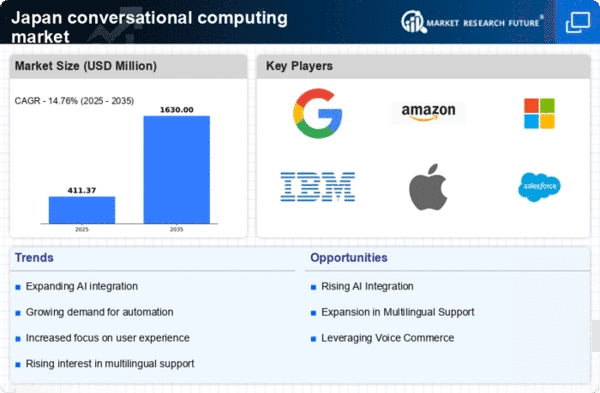Focus on Enhanced Security and Privacy
As concerns regarding data security and privacy continue to escalate, the conversational computing-platform market in Japan is witnessing a heightened focus on these issues. Organizations are increasingly aware of the need to protect sensitive customer information, leading to the implementation of robust security measures within conversational platforms. This trend is particularly relevant in sectors such as finance and healthcare, where data breaches can have severe consequences. Companies are investing in technologies that ensure compliance with stringent regulations, such as the Personal Information Protection Act (PIPA) in Japan. The emphasis on security not only helps in building consumer trust but also enhances the overall credibility of conversational computing solutions. As businesses prioritize security and privacy, the market is likely to see innovations aimed at addressing these challenges, thereby fostering a safer environment for user interactions.
Growing Demand for Customer Engagement
the conversational computing-platform market in Japan experienced a notable surge in demand for enhanced customer engagement solutions. Businesses are increasingly recognizing the importance of real-time communication with customers, leading to a projected growth rate of approximately 15% annually. This trend is driven by the need for personalized interactions, which are facilitated by advanced conversational platforms. Companies are investing in these technologies to improve customer satisfaction and retention, thereby enhancing their competitive edge. The integration of AI and machine learning into these platforms allows for more intuitive and responsive customer service, which is becoming a critical factor in the success of businesses across various sectors. As organizations strive to meet the evolving expectations of consumers, the focus on customer engagement through conversational computing is likely to intensify, further propelling the market forward.
Rising Adoption of Mobile Applications
The proliferation of mobile applications in Japan is significantly influencing the conversational computing-platform market. With over 80% of the population using smartphones, businesses are increasingly leveraging mobile platforms to engage with customers. This trend is driving the development of conversational interfaces that are optimized for mobile use, allowing for more accessible and convenient interactions. As consumers become accustomed to using apps for various services, the expectation for conversational capabilities within these applications is rising. Companies are investing in conversational computing technologies to enhance user experiences and streamline customer support through mobile channels. The integration of chatbots and voice assistants into mobile applications is becoming a standard practice, reflecting the growing importance of mobile-first strategies in the market. This shift is likely to continue, further propelling the growth of the conversational computing-platform market in Japan.
Advancements in Natural Language Processing
Natural Language Processing (NLP) technologies are rapidly evolving, significantly impacting the conversational computing-platform market in Japan. The ability of these platforms to understand and process human language is improving, with accuracy rates reaching over 90% in certain applications. This advancement enables businesses to deploy more sophisticated chatbots and virtual assistants that can handle complex queries and provide relevant responses. As a result, organizations are increasingly adopting these solutions to streamline operations and enhance user experiences. The growing reliance on NLP is indicative of a broader trend towards automation and efficiency in customer interactions. Furthermore, the Japanese market is witnessing a shift towards voice-activated systems, which are becoming integral to the conversational computing landscape. This evolution in NLP capabilities is expected to drive further investment and innovation within the market, as companies seek to leverage these technologies for competitive advantage.
Increased Investment in Digital Transformation
The ongoing digital transformation across various industries in Japan is a significant driver for the conversational computing-platform market. Organizations are allocating substantial budgets towards digital initiatives, with estimates suggesting that spending could reach ¥10 trillion by 2025. This investment is aimed at enhancing operational efficiency and improving customer interactions through advanced technologies. As businesses transition to digital-first strategies, the demand for conversational platforms that facilitate seamless communication is likely to grow. Companies are recognizing that integrating these platforms into their digital ecosystems can lead to improved customer insights and more effective marketing strategies. The push for digital transformation is not only reshaping how businesses operate but also creating a fertile ground for the conversational computing-platform market to thrive, as organizations seek innovative solutions to meet their evolving needs.

















